- HOME
- ABOUT ME
- movies
- MEDIA
- L.Onerva
- Eino Leino
- Eeva-Liisa Manner
- Erään Opon päiväkirja
- Elämänkenttäni
- Elämäni ”viiva”
- Käyttöteoriani – se miten minä ohjaan
- Kulttuuritietoinen ja kansainvälistyvä ohjaus
- Ohjauksen järjestäminen maahanmuuttajakoulutuksessa
- Ohjauksen yhteiskunnallinen viitekehys
- Ohjaukäsite
- Oma opiskeluorientaatio
- Opiskelijoiden yksilöllisyys ohjauksessa
- EETTISET KYSYMYKSET
- Psykososiaalisen kehityksen teoria
- Suhteeni erilaisuuteen ja tehtäväni opinto-ohjaajana
- Opinto-ohjauksen ja erityisopetuksen yhtäläisyyksiä ja eroja
- Kehitykseni opinto-ohjaajana
- Maahanmuuttajan uraohjaus
- Maahanmuuttajien ohjaus ja neuvonta: kuka, mitä, miten?
- Ohjauksen tulevaisuus
- Elämänkenttäni
- Mariana Marin
- Claudiu Komartin
- Mariana Codrut
- Roland Erb
- Romanian poetry
- ESSAYS
- STORIES
- CLASSIC POETRY
- CONTEMPORARY POETRY
- TRANSLATED POEMS
- READING POETRY
- CONTACT
- translated Italian-English
- translated Italian-Romanian
- translated Spanish-English
- translated Spanish-Romanian
Mariana Codrut
moartea e în altă parte / death is elsewhere
POSTED IN Mariana Codrut July 13, 2022
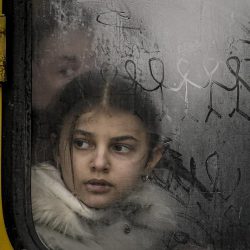
moartea e în altă parte / death is elsewhereea nu are glas de sirenă totuși
ne-acoperim bine urechile
să nu auzim cînd se-aruncă
și se-ncaieră cu alții din jur.
strîngem bine pleoapele
să nu vedem lupta inegală.
ne punem palmele pe urechi
să nu ne zdruncine
plînsul și vaietele acelora.sîntem pregătiți cu toții:
o să vină cîndva la fiecare dar
pe rînd și ca o pisică molatică
nu ca un balaur vărsînd foc
din mii de boturi. asta nu!va veni. fie. pînă atunci ținem
de-ale noastre cu fața senină –
moartea e în altă parte.MARIANA CODRUT
……………………..death is elsewhere
she has no siren’s voice though
we cover tightly our ears
so that we don’t hear when it throws itself
and scuffles with others around.
we close tightly our eyelids
so as not to see the unequal fight.
we put hands over our ears
lest we be shaken by
the weeping and wailing of those others.we are all ready:
it will come to each one of us
one day at a time, and like an idle cat
not like a dragon shedding fire
from thousands of snouts. not that!it will come. so be it. till then we hold
our own with a serene face –
death is elsewhere.
trad. M. M. Biela
feţele tale / your faces
POSTED IN Mariana Codrut February 16, 2022
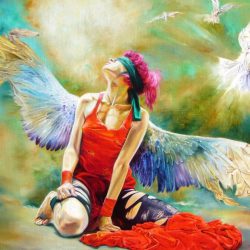
feţele tale / your facesmereu mi-au ascuns lumina din geamuri
( : moartea prin zid întindea veşnic tinere ramuri).
boleam de viaţa din mine fără măsură,
c-o creangă trecîndu-mi prin tîmpla scobită şi pură.
trimise prin tine scrisorile mele în cer n-au ajuns –
sigiliu de plumb sînt feţele tale, pe ele depus.(Ultima patrie, 2007)
MARIANA CODRUT……………….
your faces
the light from my windows they’ve always concealed
(: ever young branches, through the wall, death revealed).
sick with the life inside me with no measure
with a branch passing through my temple, hollow and pure.
my letters sent through you did not reach the sky –
lead seal are your faces on them dry.(Last Homeland, 2007)
traducere, M. M. Biela
despre iesirea din labirint / about getting out of the maze
POSTED IN Mariana Codrut February 14, 2022
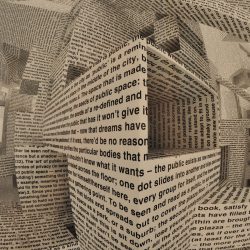
despre iesirea din labirint / about getting out of the mazesint in proprii ochi un contur instabil
si accept senina fatalitatea acestui gind.
doar stiu: ca sa poti vedea bine ceva,
distanta optima e absolut necesara.
(si cine-i in ochii lui un contur net?
cine-i departe de el insusi?
poate fericitul sau nebunul.)
cind insa nu gasesc claritatea,
cuvintele capabile sa prinda in plasa
corpul diafan si dur totodata
al unei tensiuni interioare,
sint ca insul ratacit in labirint:
cauta iesirea plin de angoasa fiindca
nu iubeste bîiguiala oraculara
a liniilor (ea numai pe cei fericiti
si pe nebuni ii scoate afara).
uneori, si un singur cuvint e de-ajuns
sa sparga zidul labirintului.
sau sa deseneze pentru mine o usa pe el.MARIANA CODRUT
……………….
about getting out of the maze
I am in my own eyes an unstable contour
and I accept serenely the fatality of this thought.
I only know: in order to see something well,
the optimal distance is absolutely necessary.
(and who is in his eyes a clear outline?
who is far from himself?
maybe the happy or the crazy.)
but when I don’t find the clarity,
the words capable of catching in the net
the ethereal and in the same time tough body
of an inner tension,
I’m like the fellow lost in the maze:
he seeks the exit full of anguish because
he doesn’t love the esoteric babbling
of the lines (she only brings out
the happy ones and the lunatics).
sometimes, one single word is enough
to break the wall of the maze.
or draw a door on it for me.traducere, M. M. Biela
o gigantă roșie / a red giant
POSTED IN Mariana Codrut February 11, 2022
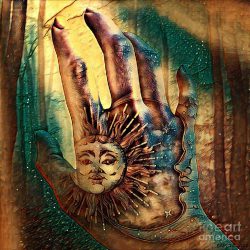
o gigantă roșie / a red giant
n-am cunoscut nimic mai viu decît mîinile mamei.
calde mereu și zbuciumate ca sîngele tînăr,
se zoreau chiar și în somn.
ele, ele aveau treabă numai cu viitorul.
asta făceau și dormind: șlefuiau pînă la transparență
pielița opacă dintre noi și ziua de mîine, să ne învingem
frica toți: copii, casă, cuiburi verzi din grădină.în timpul ăsta ea era însă cu gîndurile tot în trecut,
cel de demult, cel de aproape, de mai aproape.
așa trecutul și viitorul și-o disputau continuu
– ce mare ajunsese mama, trasă cu toată forța
și într-o parte, și-n cealaltă de viitor și de trecut!la mijloc, pe cerul albastru și rece al nopții,
o gigantă roșie. îmi luminează fața și acum.
MARIANA CODRUT
………………a red giant
I’ve known nothing more alive than my mother’s hands.
always warm and troubled like the young blood,
they rushed even in their sleep.
they, they were concerned only with the future.
that’s what they were doing even while sleeping: they furbished to transparency
the opaque skin between us and tomorrow, to conquer
fear in all of us: children, house, green nests in the garden.During this time, however, she was still thinking about the past,
the old one, the close one, the closer one.
so the past and the future were continually fighting over her
– how big my mother had become, pulled with all might
to and fro by the future and the past!in the middle, on the cold blue night sky,
a red giant. it brightens my face even now.
traducere, M. M. Biela
poezia invincibila a lumii / the invincible poetry of the world
POSTED IN Mariana Codrut February 8, 2022
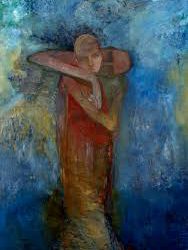
poezia invincibila a lumii / the invincible poetry of the worldnebunia poeziei e mai mare
decat nebunia banilor a sexului
a minciunii – religii eterne.ce poate fi mai nebunesc
decat poezia invincibila a lumilor
cladite pe crestetul unui zeu
cu care el a deflorat la nastere
sexul mamei sale?MARIANA CODRUT
…………………
the invincible poetry of the world
the madness of poetry is greater
than the madness of sex money
of lies – eternal religions.what could be crazier
than the invincible poetry of the worlds
built on the head of a god
with which he deflowered at birth
the sex of his mother?traducere, M. M. Biela
pulsul e o lentilă care narează / the pulse is a lens who narrates
POSTED IN Mariana Codrut January 26, 2022
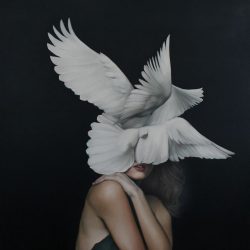
pulsul e o lentilă care narează / the pulse is a lens who narrates
mă izolez să-i aud povestea mirabilă.
el nu poate fi minimalist, doar vorbeşte
despre atîtea lucruri majore: iubire,
singurătate, noapte, zi…
la o palmă de coama dealului galata,
soarele străluceşte disperat
în falia verticală dintre armatele de nori
– ce negre, ce înspăimîntate se-apropie
una de alta! apoi vîntul răbufneşte
şi, tranc!, închide uşa aceea.
porumbelul împiedicat în ghetrele albe
ţîşneşte razant deasupra nisipului,
cu inima-n flăcări.MARIANA CODRUT
…………..
the pulse is a lens who narrates
I isolate myself to hear his miraculous story.
he can’t be minimalist, he just talks
about so many major things: love,
loneliness, night, day…
a hand’s breadth from the crest of galata hill,
the sun shines desperately
in the vertical gap between the armies of clouds
– how black, how frightened they approach
each other! Then the wind is blowing
and, bang!, closes that door.
The dove stumbling in the white gaiters
gushes out over the sand,
with a burning heart.
traducere, M. M. Biela
nu toţi sîntem egali în faţa ficţiunii / we are not all equal before fiction
POSTED IN Mariana Codrut January 14, 2022
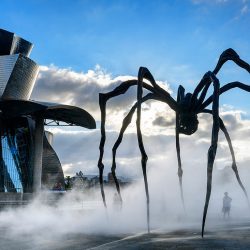
nu toţi sîntem egali în faţa ficţiunii / we are not all equal before fictionnumele e o limită, faţa e o limită,
toată fiinţa mea e o limită. o frontieră
la care se opresc cei care scriu prezentul
îngropaţi pînă la gît în ficţiune.doar eu în miezul meu (în care-mi uit
numele, faţa, întreaga fiinţă),
cînd trag propria lume din mine
milimetru cu milimetru,
cum face păianjenul
cu pînza din pîntecul lui ca să trăiască,
simt că toate-s altfel.nu toţi sîntem egali în faţa ficţiunii
cum sîntem în faţa morţii.MARIANA CODRUT
…………..
we are not all equal before fiction
the name is a limit, the face is a limit,
my whole being is a limit. a border
at which those who write the present stop
buried up to their neck in fiction.only me in my core (in which I forget
name, my face, my whole being),
when I draw my own world out of me
millimeter by millimeter,
as the spider does
with the web in its belly to live,
I feel that everything is different.we are not all equal before fiction
as we are before death.
traducere, M. M. Biela
spune-mi: ce umbre te încearcă / tell me: what shadows are testing you
POSTED IN Mariana Codrut January 9, 2022
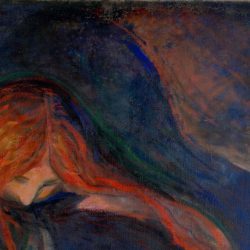
spune-mi: ce umbre te încearcă
făcînd faţa ta imperceptibil să tresară,
mîna să ţi se agite fără rost
cu degetele îngălbenite de ţigară?
spune-mi şi jură, este posibil
să existăm cu-adevărat în astă-seară
aşa apăraţi de dragoste pe dinăuntru
şi-aşa suflaţi cu aurul morţii pe dinafară?
(din vol. ”Schiță de autoportret”, 1986)
MARIANA CODRUT…………….
tell me: what shadows are testing you
making your face imperceptibly fret,
your hand senselessly to shake
with fingers yellowed by cigarette?
tell me and swear, is it possible
that we really exist tonight
inside so protected by love
and so blown with the death’s gold on th’outside?
(from the volume “Sketch of a self-portrait”, 1986)
traducere, M. M. Biela
(Edvard Munch, Love and pain)
un copil alb frigul / the cold a white child
POSTED IN Mariana Codrut January 9, 2022
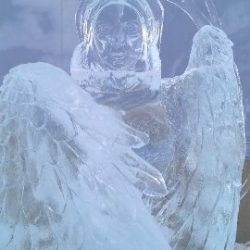
un copil alb frigul / the cold a white child
un copil alb e frigul.
nedorit în propria patrie
de febra zăpezii delirează lin:
cling-cling silabe de cristal.
îngerul lui păzitor nu suferă
chiar dacă ştie că pruncul
va muri curînd. fiindcă ştie
şi că reînviind în altceva
îi va orbi pe toţi. o epifanie.MARIANA CODRUT
……………..
the cold a white child
a white child is the cold.
unwanted in its own homeland
gently delirious with snow fever :
ding-ding crystal syllables.his guardian angel doesn’t suffer
even though he knows the baby
will die soon. because he knows
and that resurrecting in something else
it will blind them all. an epiphany.
traducere, M. M. Biela
MARIANA CODRUT
POSTED IN Mariana Codrut, Romanian December 23, 2021
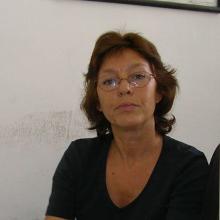
MARIANA CODRUT (1.11.1956)
1. noua ziRîndunica din cuibul de sub streaşină se puse pe ciripit. Desigur, saluta noua zi. Iată, cum nu?, pereţii începuseră să se albească, se crăpa de ziuă. Îmbujorată, mama s-a ridicat din pat, s-a îmbrăcat tăcută, fără zgomot şi a ieşit din casă – cu porcul şi cu găinile nu-i de glumă la ora asta, rup uşile de foame! Iar vaca trebuie mulsă, că îndată trece cireada pe la poartă.
Noaptea plouase bine de tot. Cu cizmele de cauciuc încălţate direct pe pielea caldă, fără şosete, mama clefăi prin glodul ogrăzii ba spre poiată, ba spre ocol, ba spre magazie, întrebîndu-se poate a mia oară: măi, cum o fi arătînd ofiţereasa aceea din al doilea război mondial, prăvălită de pe murgul cel falnic? Abia plecase biata rusoaică de la vecinii părinţilor după ce-şi spălase sîngele femeiesc în ligheanul cerut prin semne. Abia ajunsese în popuşoaiele satului de pe malul Prutului, cînd un glonţ întîmplător – de-al ruşilor? de-al românilor? de-al nemţilor? – i-a găurit capul. Şi aşa a găsit-o un consătean, cu faţa în glod. Iar calul (murg, da, da, spuneau gospodarii în şura cărora se primenise), ia-l de unde nu-i! Cu mintea necoaptă, mama n-a întrebat atunci: dar fata cum era? Şi chiar dacă ar fi întrebat, probabil i s-ar fi răspuns doar atît: frumoooasă, bre, omule, ce să mai vorbim?! Abia mult mai tîrziu, mai ales cînd ploua, mintea ei nu mai scăpa de obsesia: ce ochi avea rusoaica? Şi părul…?
Dumnezeu s-o ierte, săraca!, spuse tare, turnînd grăunţele în troacă. Apoi şi-a făcut cruce, poate a mia oară.
În urma mamei, tatăl s-a sculat şi el iute şi lipa-lipa desculţ pînă la geam. Cu o mînă ţinîndu-şi izmenele, cu cealaltă dînd deoparte de-un lat de palmă storul, aruncă o căutătură afară: sîrmele de rufe străluceau îmbrobonate cu mii de mărgele de apă, zarzărul şi salcîmii grei de frunze erau uzi, portiţa şi gardurile de scînduri, ude şi negre. Doar o dungă de zare sclipea luminoasă. Cu colţul ochiului, văzu flaneaua roşie a nevestei în drum spre fîntînă. Ar fi trebuit să se îmbrace şi el şi s-o pornească la treburi, că doar nu-i duminică. Acuş! S-a furişat în celălalt pat, la picioarele copilei care dormea cu faţa la fereastră. Fetica, fetica!, murmura liniştitor înghiţindu-şi cu zgomot scuipatul, în timp ce-şi strecura cu grijă sexul întărit între petalele ei roz…
Rîndunica din cuibul de sub streaşină începu să se zbată şi să ţipe ascuţit: ucigaşul azurului, ucigaşul azurului, ucigaşul azurului! Poate că cineva ar fi priceput ce zice. Dar nimeni n-a auzit-o, toţi fiind ocupaţi cu ale lor. Primele raze de soare pipăiau fruntea umezită de somn, intrau printre pleoapele transparente ale fetiţei. Iar în ogradă, lighioanele hămesite zbierau şi băteau din aripi, nedîndu-şi rînd la mîncare.
* Cu acest text literar Mariana Codrut a obtinut Premiul Spiegelungen pentru proza scurta pe anul anul 2020 la cocursul ” Microlite:dincolo de Celan”, organizat de Institut für Deutsche Kultur und Geschichte Südosteuropas al Universitatii Ludwig-Maximilian din München.
Ca urmare “Noua Zi” a fost publicata in reviste din Germania si Ucraina.
the new day
The nestling swallow under the eaves started chirping. Of course, greeting the new day. Well, why not?, the walls had begun to whiten, the dawn was breaking. Blushing flushed, mother got out of bed, dressed silently, noiselessly, and went out of the house – with the pig and the hens, it’s no joke at this hour, they break the doors of hunger! And the cow must be milked, because the herd any moment now will pass by the gate.
In the night it rained heavily. With her rubber boots directly on her warm skin, without socks, the mother splashed her way through the muddy yard, now to the barn, now to the cowshed, or to the storeroom, wondering for the thousandth time: man, what would that World War II officer’s wife looked like, fallen off her noble chestnut stud? The poor Russian woman had just left her parents’ neighbors after washing away her female blood in the laver asked for by signs. She had just arrived in the village’s maize on the bank of the Prut River, when a stray bullet – from the Russians? from the Romanians? from the Germans? – pierced her head. That’s how a fellow villager found her, with the face in the mud. And the horse (chestnut, ye, ye, said the householders in whose barn she had freshened up), vanished into thin air! With a green mind, the mother didn’t ask then: but what was the girl like? And even if she had asked, she would probably have been answered just that: pretty lady, man, what more can we say?! Only much later, especially when it was raining, did her mind not escape the obsession: what eyes did the Russian woman have? And the hair …?
God forgive her, poor thing!, she said loudly, pouring the grains into the trough. Then she made a cross, maybe for the thousandth time.After the mother, the father got up quickly and stealthily barefoot to the window. With one hand holding his drawers, with the other hand setting aside a palm wide the blinds, he peeked outside: the wires of laundry shone adorned with thousands of water beads, the heavy leafy apricot and acacias were wet, the gate and plank fences, wet and black. Only a horizon stripe shone brightly. Out of the corner of his eye, he saw his wife’s red flannel on the way to the well. He should have gotten dressed and set to work because it’s not Sunday. Soon!
He snuck into the other bed at the feet of the sleeping child facing the window. Girlie! girlie!, he murmured soothingly, swallowing his spitting with a noise, while ‑ he carefully slipped his hardened sex between her pink petals …The nestling swallow under the eaves began to struggle and scream shrilly: the killer of the azure, the killer of the azure, the killer of the azure!
Maybe someone would have understood what it was saying. But no one heard it, all being busy with their own. The first rays of sunlight were touching the sleep-dampened forehead, coming through the little girl’s transparent eyelids. And in the yard, the famished beasts were screaming and flapping their wings, not taking a turn to eat.
*With this literary text Mariana Codrut won the Spiegelungen Prize for short prose for 2020 at the competition “Microlite: beyond Celan”, organized by the Institute für Deutsche Kultur und Geschichte Südosteuropas of the Ludwig-Maximilian University of Munich.
As a result, “New Day” “was published in magazines in Germany and Ukraine.
2. drum rece
ca să nu te supui, stai singur. e secolul supunerii.
ca să nu aderi, stai singur. e secolul aderărilor.
ca să nu fii „în rînd cu lumea”, stai singur.
e secolul neieşirii din rînd.chiar cînd ţi-e puţintel dor
pînă şi de vorbăraia menită să ucidă liniştea
– liniştea e cea mai mare sperietoare a vremii -,
alegi să fii singur. un individualist, un ins dubios!stînd sub copaci cu capul plecat pe o carte
(te încearcă în glumă cînd şi cînd teama
pentru gîtul dezgolit la ceafă), eşti fericit:
tocmai ai aflatcă şuşaua colbuită spre drumul judeţean
unde frigul te albăstrea în copilărie se cheamă
drum rece, că drum rece era şi peste sat,
calea păsărilor migratoare spre deltă.dar: în zilele cînd nu mai înţelegi nimic
şi cărţile nu-ţi mai spun nimic
iar străinul se desparte şi de el însuşi.
cînd auzi pulsul singurărăţii bătînd ritmic
în cap ca un ciocan, anxietatea îşi ridică
botul ud de sînge din pieptul tău,
sigură de sine şi lacomă ca leul
călare pe antilopa ţintuită la pămînt.fără puteri zile şi zile pe gheaţa de-un deget
(ce transparenţă!), înviezi brusc la vederea
feţelor din străfunduri. tot aplecat,
formele iraţionale să le distingi
în evantaiul lor de sensuri, încerci să-ţi spui
singur o poveste. însă, la fel de abur,
de imponderabil ca atunci cînd eşti fericit,
îţi dai seama că ai uitat toate cuvintele.
doar apa foşneşte dedesubt încontinuu.
cold road
so as not to obey, stand alone, it is the century of obedience.
so as not to adhere, stand alone, it is the century of adherence.
so as not to “comply with others”, stand alone.
it is the century of not getting out of line.even when you miss a little
even the chatter meant to kill the silence
– silence is the greatest scarecrow of the time -,
you choose to be alone. an individualist, a shady fellow!sitting under the trees with your head bowed on a book
(jokingly now and then you fear
for the bare back of your neck), you are happy:
you just found outthat the cobbled path to the county road
where the cold blued you as a child is called
cold road, that cold road was also over the village,
the path of migrating birds to the delta.but: on days when you no longer understand anything
and the books don’t tell you anything
and the stranger is also parting with himself.
when you hear the pulse of loneliness beating rhythmically
in your head like a hammer, your anxiety rises
its blood-soaked snout from your chest,
self-assured and greedy like the lion
riding on the antelope pinned to the ground.powerless for days and days on the one-finger ice
(what transparency!), you suddenly come alive to the sight
of the faces from the depths. still bent over,
the irrational shapes to distinguish
in their fan of meanings, you try to tell yourself
alone a story. but just as steamy,
as imponderable as when you’re happy,
you realize you’ve forgotten all the words.
only the water rustles underneath continuously.
3. (împărţit…)
împărţit între umilinţă
şi orgolii dezastruoase
primind în plex propriul
vaier răsfrînt de cuvinte
el – un condiment preţios
scos de zile mari
pentru vînatul la tavă –
îţi reaminteşte
cînd nu e cazul:
eu sînt poetul!
(din vol. “existenţă acută”, C.R., 1994)
(divided…)
divided between humility
and disastrous egos
receiving in the plexus his own
groan reflected in words
he – a precious spice
taken out on special days
for the hunt on the platter –
reminds you
when it is not the case:
I am the poet!
(From the volume “acute existence”, C.R., 1994)
4. ce spui, Doamne, tuturor
ce spui Tu în acelaşi timp la toţi
n-are nici o logică pentru mine –
eu sînt asociala incapabilă să audă
vorbele zise tuturor deodată.
zi-mi doar mie ceva
(dar nu singurătate, nu frică
sau revoltă, le ştiu),
ceva puternic pînă la implozie.
voi fi numai ochi şi urechi
şi voi înţelege totul în felul
în care iarna înţelege ningînd.
Lord, what you say to everyone
what you say at once to everyone
makes no sense to me-
I am the asocial unable to hear
the words told to everyone at once.
tell only me something
(but not loneliness, not fear
or revolt, I know them),
something powerful to the point of implosion.
I will be only eyes and ears
and I will understand everything the way
winter understands by snowing.
5. luna asta
plutind ca o raţă-nfoiată deasupra
(noi sîntem în adîncuri, dedesubt)
nu are nici o legătură cu singurătatea noastră,
cu fruntea pură a mamei din tinereţile ei
exterminate de istoria românească
ori cu ecranul luminos în care mă văd.
ea e din altă tara.
this moon
floating above like a fluffy duck
(we are in deep, below)
it has nothing to do with our loneliness,
with the pure forehead of mother from her youth
exterminated by Romanian history
or with the bright screen in which I see myself
it’s from another country.
6. cum curge ploaia
ascult darabana ploii pe blocuri, franchețea ei pură. franchețea ei absurdă într-o țară unde până și moartea e un politician: nu-i pasă de aparențe, nici de ce se ascunde sub ele, un singur țel pompându-i sângele-n inimă – să învingă.
cum curge ploaia într-o țară de politicieni, un teatru în care personajelor de prim-plan le-au luat locul maimuțele cu funduri roșii… că-i iarnă, că-i vară, fug maimuțele de lumină: jos, în cuibul șobolanilor. sus, în podul cu molii drogate cu aburi de făină. dar teamă n-au: steaguri ale dezastrului, pe acoperișuri flutură pieile nobile puse pe bețe.
how the rain flows
I listen to the drumming of rain on the blocks, its pure frankness. its absurd frankness in a country where even death is a politician: it doesn’t care about appearances, nor what hides beneath them, one goal pumping its blood to the heart – to win.
how the rain flows in a country of politicians, a theater in which the leading characters were replaced by monkeys with red bottoms… be it winter, be it summer, the monkeys run away from the light: down under, in the rat’s nest. up, in the attic with flour steam drugged moths. but they have no fear: flags of disaster, noble skins on sticks flutter on the roofs.
7. ritual
în fiecare dimineaţă
rup cordonul visului
şi intru în realitate
cu inima grea de teamă
de ruşine
de gînduri stătute.
mă învîrt printre voi
– animal stupid care
oprindu-se în răstimpuri
priveşte în jur suspicios
şi ţipă fără pricină.
în fiecare dimineaţă
pornesc în căutarea
unei lumi vii
cu inima grea
de teamă
de silă
de gînduri stătute.
(Poezie publicată în vol. “existenţă acută”, Cartea Românească, 1994, cenzurată fiind din vol. anterior, “tabieturile nopţii de vară”, C.R., 1989.)
ritual
every morning
I break the dream cord
and enter reality
with a heart heavy of fear
of shame
of stale thoughts.
I’m among you
– stupid animal that
stopping at times
looks around suspiciously
and screams for no reason.
every morning
I start looking
for a living world
with a heavy heart
of fear
of loathing
of stale thoughts.
(Poem published in the vol. “acute existence”, Cartea Românească, 1994, censored from the previous vol. “habits of the summer night”, C.R., 1989)
8. macesul din magazia de lemne
in acest ultim patrar de secol fara nici un curaj sa fii inlocuitoarea domnisoarei batrane moarte (in aprilie) de lupus tuberculos
(cate un starc argintiu in balta argintie tremura soarele toamnei).
sa fii o mica pata portocalie vaslind in centimetrul tau de aer printre cateva planuri de lectie si imaginea domnisoarei profesoare cu trei pisici in brate.
(in fata, campul deschis inspaimanta).
cand in magazia de lemne
macesul suporta dogoarea intunericulu
the rosehip in the woodshed
in this last quarter of a century without any courage to be the replacement of the old lady who died (in April) of tuberculous lupus
(a silver heron in the silver pond trembles the autumn sun).
to be a small orange spot oaring in your inch of air between a few lesson plans and the image of the teacher with three cats in her arms.
(in front, the open field frightens).
when in the woodshed
the rosehip bears the sting of darkness.
9. natura nu e bovarică
natura nu e bovarică, nu se dă drept alta niciodată:
nici hrănită cu lecturi romantice regina-nopţii
nu-şi uită locul. ploaia nu merge prin oraş aferată
ca o actriţă şi, chiar cînd cade oblic, vorbeşte direct,
răspicat – şi ei îi e silă de bolmojeala oraculară.
viespile îmbătate de alcoolul perelor
au viziuni extatice fără să ne ceară voie – doar ştii,
tu ai cules perele din iarbă! vîntului nu-i pasă
ce credem noi despre el, nici tunetul nu se dedă
la spectacol (mă grăbesc să-ţi spun tot,
timp nu mai e mult pentru noi…).
toţi îşi vorbesc limba maternă firesc, natural,
cu măreţie. noi de ce n-am face la fel?
nature is not bovaric
nature is not bovaric, it’s not pretending to be someone else:
nor fed with romantic readings queen-night
never forgets her place. the rain doesn’t walk through the city fussy
like an actress and, even when it falls obliquely, speaks directly,
bluntly, and she’s sick of oracular mumbling.
wasps drunk on pear alcohol
they have ecstatic visions without asking our permission – you know it,
you picked pears from the grass! the wind doesn’t care
what we think of it, the thunder does not
show off itself either (I hasten to tell you all,
there is not much time left for us…).
they all speak their mother tongue innately, naturally,
with greatness. why shouldn’t we do the same?
traducere, M. M. Biela

Copyright © 2024 by Magdalena Biela. All rights reserved.